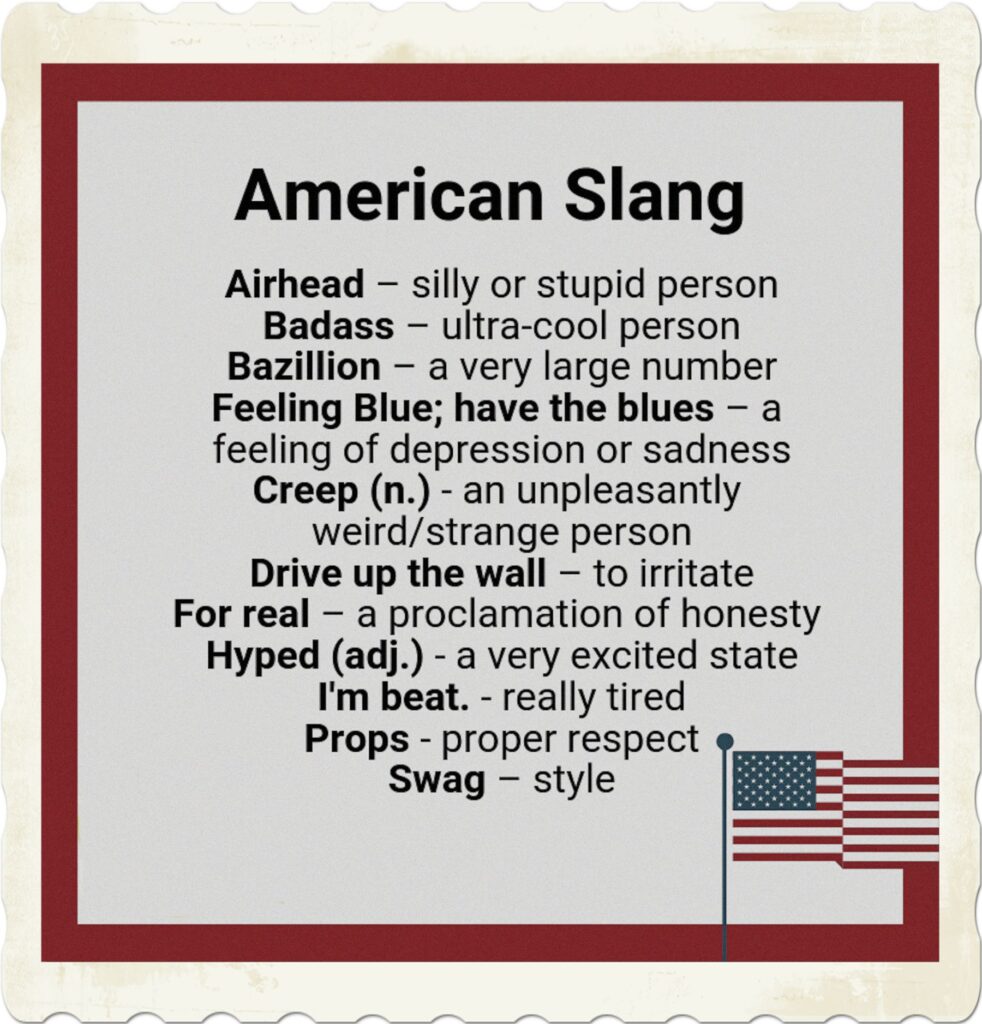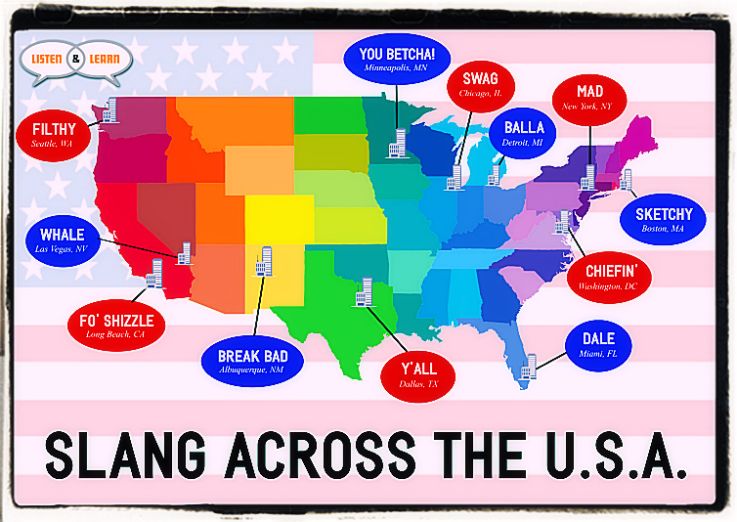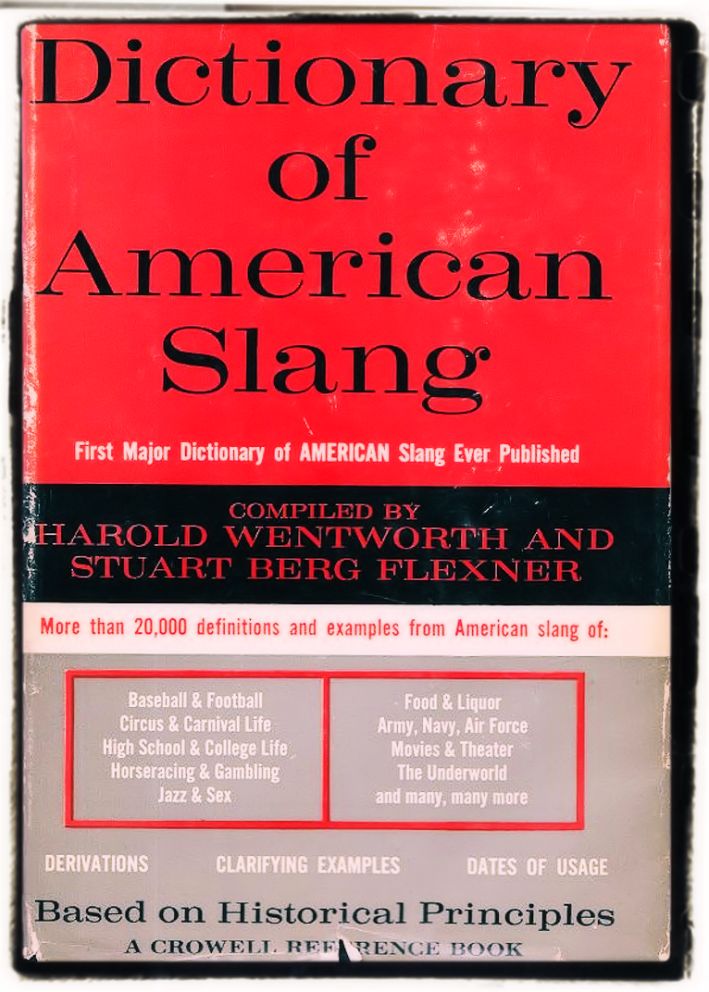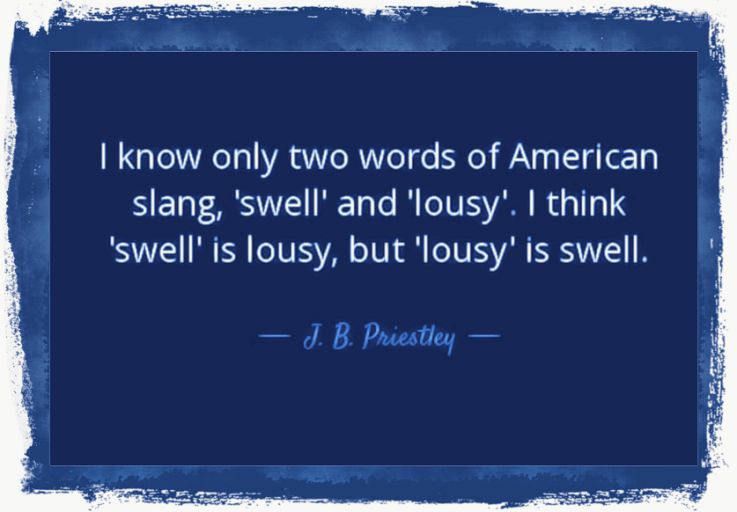
The counters merely say that the person is rejected – he does not belong to the group. In uttering the counter we don’t care what the person is; we are pledging our own group loyalty, affirming our identity, and expressing our satisfaction at being accepted. In like manner, at various periods in history, our slang has abounded in words reflecting the fear, distrust, and dislike of people unlike ourselves. This intolerance is shown by the many derogatory slang words for different immigrant, religious, and racial groups: Chink, greaser, Heinix, honkie, mick, mockie, nigger, spik. Many counters and derogatory words try to identify our own group status, to dare others to question our group’s, and therefore our own, superiority. Sometimes slang is used to escape the dull familiarity of standard words, to suggest an escape from the established routine of everyday life. When slang is used, our life seems a little fresher and a little more personal. Also, as at all levels of speech, slang is sometimes used for the pure joy of making sounds, or even for a need to attract attention by making noise.
The sheer newness and informality of certain slang words produces a pleasure. But more important than this expression of a more or less hidden esthetic motive on the part of the speaker is slang’s reflection of the personality, the outward, clearly visible characteristics of the speaker. By and large, the man who uses slang is a forceful, pleasing, accept-able personality. Morality and intellect (too frequently not considered virtues in the modern American man) are over-looked in slang, and this has led to a type of reverse morality : many words, once standing for morally good things, are now critical. No one, for example, though these words were once considered complimentary, wants to be called a prude or Puritan. Even in standard usage they are mildly derisive. Moreover, few of the many slang synonyms for drunk are derogatory or critical. To call a person a standard drunk may imply a superior but unsophisticated attitude toward drinking.
Thus we use slang and say someone is boozed up, gassed, high, potted, stinking, has a glow on, etc., in a verbal attempt to convey our understanding and awareness. These slang words show that we too are human and know the effects of excessive drinking. In the same spirit we refer to people sexually as big ass man, fast, John, sex pot, shack job, wolf, etc., all of which accept unsanctioned sexual intercourse as a matter of fact. These words are often used in a complimentary way and in admiration or envy. They always show acceptance of the person as a “regular guy.” They are never used to express a moral judgment. Slang has few complimentary or even purely descriptive words for “virgin,” “good girl,” or “gentleman.” Slang has bag, bat, ex, gold digger, jerk, money mad, n.g., old lady, square, etc.; but how many words are there for a good wife and mother, an attractive and chaste woman, an honest, hard-working man who is kind to his family, or even a respected elderly person? Slang – and it is frequently true for all language levels – always tends toward degradation rather than elevation.
As slang shows, we would rather share or accept vices than be excluded from a social group. For this reason, for self-defense, and to create an aura (but not the fact) of modernity and individuality, much of our slang purposely expresses amorality, cynicism, and “toughness.” Reverse morality also affects slang in other ways. Many use slang just because it is not standard or polite. Many use slang to show their rebellion against boobs, fuddy duddies, marks, and squares. Intellectuals and politicians often use slang to create the “common touch” and others use slang to express either their anti-intellectualism or avant-garde leanings. Thus, for teenagers, entertainers, college students, beatniks, jazz fans, intellectuals, and other large groups, slang is often used in preference to standard words and expressions. Slang is the “official” modern language of certain vociferous groups in our population. In my work on this dictionary, I was constantly aware that most American slang is created and used by males. Many types of slang words – including the taboo and strongly derogatory ones, those referring to sex, women, work, money, whiskey,’ politics, transportation, sports, and the like – refer primarily to male endeavor and interest. The majority of entries in this dictionary could be labeled “primarily masculine use.”
Men belong to more sub-groups than do women; men create and use occupational cant and jargon; in business, men have acquaintances who belong to many different sub-groups. Women, on the other hand, still tend to be restricted to family and neighborhood friends. Women have very little of their own slang. The new words applied to women’s clothing, hair styles, homes, kitchen utensils and gadgets are usually created by men. Except when she accompanies her boy friend or husband to his recreation (baseball, hunting, etc.) a woman seldom mingles with other groups. When women do mingle outside of their own neighborhood and family circles, they do not often talk of the outside it would appear that the word having the most slang synonyms is drunk. Women who do work usually replace men at men’s jobs, are less involved in business life than men, and have a shorter business career (often but an interim between school and marriage). The major female sub-groups contributing to American slang are: airline stewardesses, beauty-parlor operators, chorus girls, nurses, prostitutes, and waitresses. World of business, politics, or other fields of general interest where new feminine names for objects, concepts, and view-points could evolve.

Men also tend to avoid words that sound feminine or weak. Thus there are sexual differences in even the standard vocabularies of men and women. A woman may ask her husband to set the table for dinner, asking him to put out the silver, crystal, and china – while the man will set the table with knives, forks, spoons, glasses, and dishes. His wife might think the table linen attractive, the husband might think the tablecloth and napkins pretty. A man will buy a pocketbook as a gift for his wife, who will receive a bag. The couple will live under the same roof, the wife in her home, the man in his house. Once outside of their domesticity the man will begin to use slang quicker than the woman. She’ll get into the car while he’ll get into the jalopy or Chevvie. And so they go : she will learn much of her general slang from him; for any word she associates with the home, her personal be-longings, or any female concept, he will continue to use a less descriptive, less personal one. Males also use slang to shock.
The rapid tempo of life, combined with the sometimes low boiling point of males, can evoke emotions, admiration, joy, contempt, anger, stronger than our old standard vocabulary can convey. In the stress of the moment a man is not just in a standard “untenable position,” he is up the creek. Under strong anger a man does not feel that another is a mere “incompetent”- he is a jerk or a fuck-off. Men also seem to relish hyperbole in slang. Under many situations, men do not see or care to express fine shades of meaning : a girl is either a knockout or a dog, liquor either good stuff or panther piss, a person either has guts or is chicken, a book is either great or nothing but crap. Men also like slang and collo-quial wording because they express action or even violence : we draw pay, pull a boner, make a score, grab some sleep, feed our face, kill time – in every in-stance we tend to use the transitive verb, making ourselves the active doer. The relation between a sub-group’s psychology and its cant and jargon is interesting, and the relation between an individual’s vocabulary and psychological personality is even more so.
Slang can be one of the most revealing things about a person, because our own personal slang vocabulary contains many words used by choice, words which we use to create our own image, words which we find personally appealing and evocative – as opposed to our frequent use of standard words merely from early teaching and habit. Whether a man calls his wife baby, doll, honey, the little iconzan, the Mrs., or my old lady certainly reveals much about him. What words one uses to refer to a mother (Mom, old lady), friend (buddy, bunkie, old man), the bathroom (can, John, little boy’s room), parts of the body and sex acts (boobies, gigi, hard, laid, score), being tired (all in, beat), being drunk (clobbered, high, lit up like a Christmas tree, paralyzed), and the like, reveal much about a person and his motivations. (For just the last example, clobbered may indicate that a drinker is punishing himself, high that he is escaping, lit up like a Christmas tree that he is seeking attention and a more dominant personality, and paralyzed that he seeks punishment, escape or death.) The basic metaphors, at any rate, for all levels of language depend on the five senses.
Thus rough, smooth, touch; prune, sour puss, sweet; fishy, p.u., rotten egg; blow, loud; blue, red, square. In slang, many metaphors refer to touch (including the sense of heat and cold) and to taste. Food is probably our most popular slang image. Food from the farm, kitchen, or table, and its shape, color, and taste suggest many slang metaphors. This is because food can appeal to taste, smell, sight, and touch, four of our five senses; because food is a major, universal image to all people, all sub-groups ; because men work to provide it and women devote much time to buying and preparing it; because food is before our eyes three times every day. Many standard food words mean money in nonstandard use: cabbage, kale, lettuce. Many apply to parts of the body: cabbage head, cauliflower ear, meat hooks, nuts, plates of meat. Many food words refer to people: apple, cold fish, Frog, fruitcake, honey, sweetie pie. Others refer to general situations and attitudes: to brew a plot, to receive a chewing out, to find oneself in a pickle or something not kosher, to be unable to swallow another story, to ask what’s cooking? Many drunk words also have food images: boiled, fried, pickled; and so do many words for nonsense: apple-sauce, banana oil, spinach. Many standard food words also have sexual meanings in slang. The many food words for money, parts of the body, people, and sex reveal that food means much more to us than mere nourishment. When a good egg brings home the bacon to his honey, or when a string bean of a sugar daddy takes his piece of barbecue out to get fried with his hard-earned kale, food images have gone a long way from the farm, kitchen, and table.

Sex has contributed comparatively few words to modern slang, but these are among our most frequently used. (Many so-called bedroom words are not technically slang at all, but are sometimes associated with slang only because standard speech has rejected them as taboo. However, many of these taboo words do have further metaphorical meanings in slang: fucked, jerk, screw you, etc. On the other hand, Madame de Stael is re-ported to have complimented one of her favorite lovers with “speech is not his language.”) The use of sex words to refer to sex in polite society and as metaphors in other fields is increasing. Sex metaphors are common for the same conscious reasons that food metaphors are. Sex appeals to, and can be used to apply to, most of the five senses. It is common to all persons in all sub-groups, and so we are aware of it continually.
Slang words for sexual attraction and for a variety of sexual acts, positions, and relationships are more common than standard words. Standard non-taboo words referring to sex are so scarce or remote and scientific that slang is often used in referring to the most romantic, the most obscene, and the most humorous sexual situations. Slang is so universally used in sexual communication that when “a man meets a maid” it is best for all concerned that they know slang. Slang words for sex carry little emotional connotation; they express naked desire or mechanical acts, devises, and positions. They are often blunt, cynical and “tough.” The subconscious relating of sex and food is also apparent from reading this dictionary. Many words with primary, standard meanings of food have sexual slang meanings. The body, parts of the body, and descriptions of each, often call food terms into use: banana, bread, cheese cake, cherry, jelly roll, meat, etc.
Beloved, or simply sexually attractive, people are also often called by food names: cookie, cup of tea, honey, peach, quail, tomato, etc. This primary relation between sex and food depends on the fact that they are man’s two major sensuous experiences. They are shared by all personalities and all sub-groups and they appeal to the same senses, thus there is bound to be some overlapping in words and imagery. However, there are too many standard food words having sexual meanings in slang for these conscious reasons to suffice. Sex and food seem to be related in our subconscious. Also of special interest is the number of slang expressions relating sex and cheating. Used metaphorically, many sex words have secondary meanings of being cheated, deceived, swindled, or taken ad-vantage of, and several words whose primary meaning is cheating or deceiving have further specific sexual meanings: cheating, fucked, make, royal screwing, score, turn a trick, etc. As expressed in slang, sex is a trick somehow, a deception, a way to cheat and deceive us. To curse someone we can say fuck you or screw you, which expresses a wish to deprive him of his good luck, his success, perhaps even his potency as a man. (See F. P. Wood, “The Vocabulary of Failure,” Better English, Nov., 1938, p. 34.
The vocabulary of failure is itself very revealing. Failure in one’s personality, school, job, business, or an attempted love affair are all expressed by the same vocabulary. One gets the brush off, the gate, a kiss off, or walking papers in both business and personal relationships. As the previous discussion of counter-words demonstrates, slang allows no distinction or degree among individual failures. Incompetence does not apply to just one job or facet of life – either one belongs or is considered unworthy. This unworthiness applies to the entire personality, there are no alternate avenues for success or happiness. One is not merely of limited intelligence, not merely an introvert, not merely ugly, unknowing, or lacking in aggression – but one is a failure in all these things, a complete drip, jerk, or square. The basic failure is that of personality, the person is not a mere failure – he is an outcast, an untouchable; he is taboo.)
Sex is also associated with confusion, exhausting tasks, and disaster: ball buster, screwed up, snafu, etc. It seems clear, therefore, that, in slang, success and sexual energy are related or, to put it more accurately, that thwarted sexual energy will somehow result in personal disaster. Language is a social symbol. The rise of the middle class coincided with the period of great dictionary makers, theoretical grammarians, and the “correct usage” dogma. The new middle class gave authority to the dictionaries and grammarians in return for “correct usage” rules that helped solidify their social position. Today, newspaper ads still implore us to take mail-order courses in order to “learn to speak like a college graduate,” and some misguided English instructors still give a good speaking ability as the primary reason for higher education.

The gap between “correct usage” and modern practice widens each day. Are there valid theoretical rules for speaking good English, or should “observed usage” be the main consideration? Standard words do not necessarily make for precise, forceful, or useful speech. On the other hand, “observed usage” can never promise logic and clarity. Today, we have come to depend on “observed usage,” just as eighteenth- and nine-teenth-century social climbers depended on “correct usage,” for social acceptance. Because it is not standard, formal, or acceptable under all conditions, slang is usually considered vulgar, impolite, or boorish. However, the vast majority of slang words and expressions are neither taboo, vulgar, derogatory, nor offensive in meaning, sound, or image. There is no reason to avoid any useful, explicit word merely because it is labeled “slang.” Our present language has not decayed from some past and perfect “King’s English,” Latin, Greek, or pre-Tower of Babel tongue. All languages and all words have been, are, and can only be but conventions mutually agreed upon for the sake of communicating. Slang came to America on the Mayflower. In general, it is not vulgar, new, or even peculiarly American: an obvious illustration of this is the polite, old French word tete, which was originally slang from a Latin word testa-cooking pot.
Cant and jargon in no way refer only to the peculiar words of undesirable or underworld groups. Slang does not necessarily come from the underworld, dope addicts, degenerates, hoboes, and the like. Any cultural sub-group develops its own personal cant and jargon which can later become general slang. All of us belong to several of these specific sub-groups using our own cant and jargon. Teenagers, steel workers, soldiers, Southerners, narcotic addicts, church-goers, truck drivers, advertising men, jazz musicians, pickpockets, retail sales-men in every field, golf players, immigrants from every country, college professors, baseball fans, all belong to typical sub-groups from which slang originate. Some of these sub-groups are colorful; most are composed of prosaic average people.
Many people erroneously believe that a fundamental of slang is that it is intentionally picturesque, strained in metaphor, or jocular. Picturesque metaphor and metonymy, hyperbole, and irony does or should occur frequently in all levels of speech. Picturesque metaphor is a frequent characteristic of slang, but it does not define slang or exist as an inherent part of it. The picturesque or metaphorical aspect of slang is often due to its direct honesty or to its newness. Many standard usages are just as picturesque, but we have forgotten their original metaphor through habitual use. Thus slang’s jerk and windbag are no more picturesque than the standard incompetent and fool. Incompetent is from the Latin competens plus the negating prefix in- and = “unable or unwilling to compete”; fool is Old French, from the Latin follis which actually = “bellows or wind bag”; slang’s windbag and the standard fool actually have the same metaphor. As for picturesque sounds, I find very few in slang. Onomatopoeia, reduplications, harsh sounds and pleasing sounds, even rhyming terms, exist on all levels of speech. Readers of this dictionary will find no more picturesque or unusual sounds here than in a similar length dictionary of standard words. Many slang words are homonyms for standard words.
As has been frequently pointed out, many slang words have the same meaning. There seems to be an unnecessary abundance of counter-words, synonyms for “drunk”, hundreds of fad words with almost the same meaning, etc. This is because slang introduces word after word year after year from many, many sub-groups. But slang is a scatter-gun process; many new words come at the general public; most are ignored; a few stick in the popular mind. Remember that “slang” actually does not exist as an entity except in the minds of those of us who study the language. People express themselves and are seldom aware that they are using the artificial divisions of “slang” or “standard”. First and forever, language is language, an attempt at communication and self-expression. The fact that some words or expressions are labeled “slang” while others are labeled “jargon” or said to be “from the Anglo-Saxon” is of little value except to scholars. Thus this dictionary is a legitimate addition to standard dictionaries, defining many words just as meaningful as and often more succinct, useful, and popular than many words in standard dictionaries.
Stuart Berg Flexner (1975)
American slang dictionaries online
Since slang is constantly changing, it can be difficult to find definitions of certain terms in a printed dictionary. Luckily, there are many different websites offering rich collections of funny American slang words. For example:
Dave’s ESL Cafe has a short guide to American slang designed to assist those who are learning English as a second language.
Dictionary of American Regional English (DARE) breaks the U.S. into multiple regions and subregions. It only includes words that are used regionally. Audio clips are included for many words, giving you the opportunity to hear the regional slang word being said.
ManyThings has a list of more than 280 American slang definitions sorted alphabetically. Example sentences are provided with each term to make it easier to understand the correct usage.
Urban Dictionary is a large website that allows users to submit their own definitions for various slang terms. While the quality of the information can sometimes be questionable, this site is often the best resource for learning more about obscure slang usage.
Slang City, although not a dictionary in the traditional sense, is another great resource for anyone interested in learning more about American street slang. This entertaining website features articles, illustrated topical guides to various types of slang, and interactive games such as the “Random Insult Generator.”

